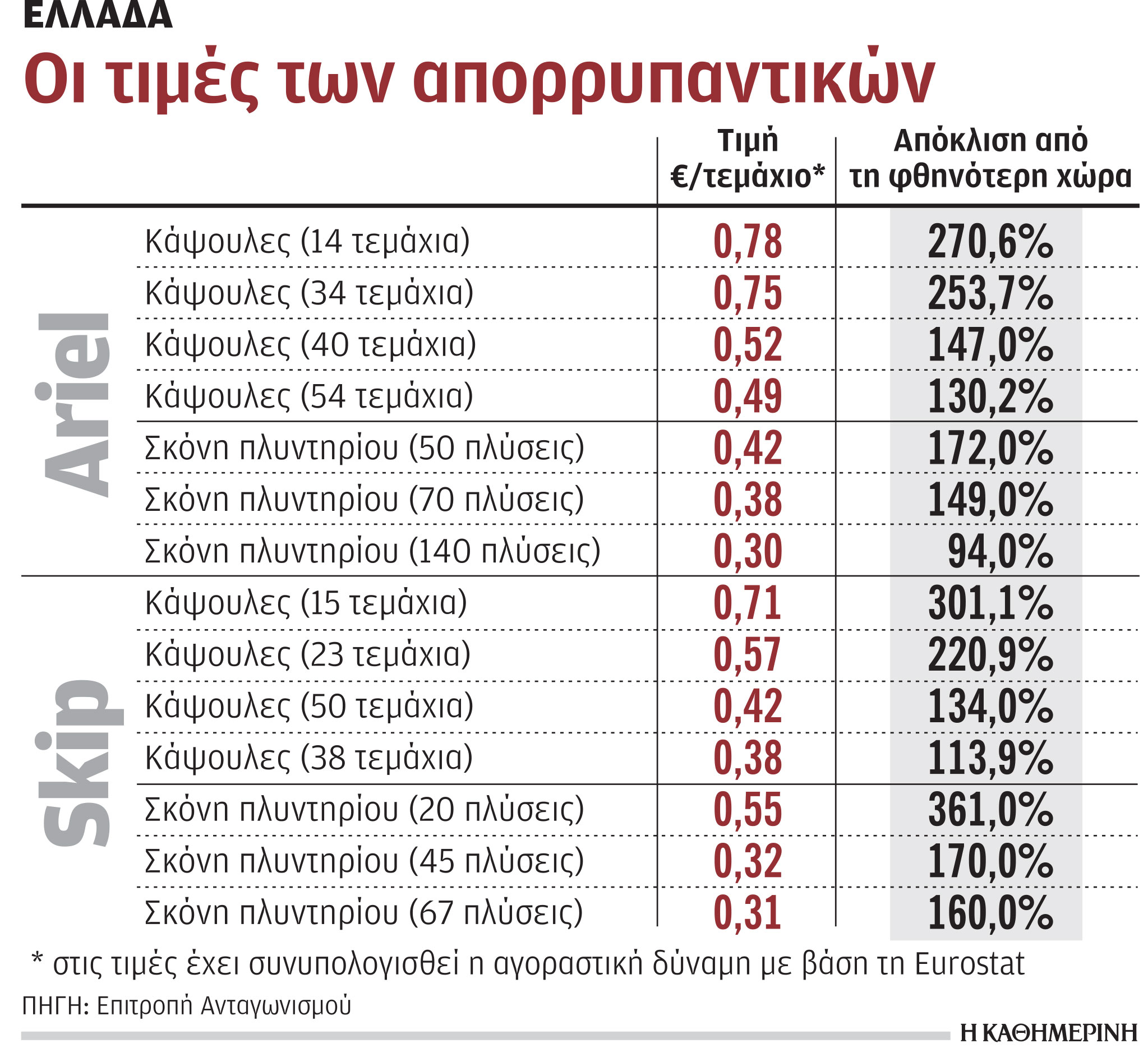
“In the center”, as it is usually called, is produced Competition Commission two multinational corporations, Unilever And P&Gwhich have the largest market share in the category of laundry detergents, since, according to the results of a price survey in Greece and other European countries carried out by the Authority, it appears that the products of the two above companies are sold in Greece 113.92% to 361% more expensive compared to the cheapest country in the EU is Ireland, as well as cheap countries based on purchasing power such as Sweden and Germany.
What are the reasons why the Competition Commission has started this price investigation and, above all, the publication of the results in the newsletter published yesterday?
First of all, because since July there has been a significant increase inflation from the broader ‘home cleaning products’ category in Greece compared to the Eurozone.
According to her EurostatIf before June the discrepancy was small (an increase of 5.7% in the euro area and 5.8% in Greece), then in July it reached 7.3% in the euro area and 8.1% in Greece, and in the following months it increased even more (8.2% and 11.4%). % respectively in August, and so on).
Also in December, the indicated index increased in Greece by 2.5 percentage points compared to November, while the price increase for detergents amounted to 15.9% in December against 13.4% in November 2022. Secondly, with the publication of data by the Competition Commission (EC), it is mainly aimed at causing price reductions on the part of companies, since, at a minimum, the publication of data on high prices, and indeed in comparison with countries with higher purchasing power , may affect the pricing policy of transnational corporations.
It should be noted that although E.A. refrains from publicizing its findings on the causes of high prices in Greece, the possibility of anti-competitive practices being investigated next year should not be ruled out.
However, according to competent sources and market analysts, the three main reasons are the small size of the Greek market, which in fact does not create an incentive for great price competition, low penetration of private label products in the category of laundry detergents. , as well as very little domestic production.
Even if E.A. does not continue to publish the interpretation of high prices, his observations are quite revealing:
• Greece is included in the group of countries with high prices, regardless of the size of the package. This fact does not seem to depend on the geographical factor, since Greece and Cyprus have a large price difference (in Cyprus prices are cheaper), although additional costs are probably necessary to transport the product to Cyprus due to the geographical location. .
• In Greece, the smaller the package, the higher the price per piece (for capsules). In a package of 14 pieces, the price per piece is 0.66 euros, and in a package of 54 pieces, 0.44 euros. In the Netherlands, for example, the price per piece is not differentiated.
As part of the investigation, products in capsules and laundry detergent brands Skip and Ariel were investigated.
Four more key products under the microscope
Under the microscope of the competition commission are not only washing powders, but also four other key products. In particular, the Authority decided to map the competitive conditions in that market, as well as in the markets for fresh milk, baby milk, cheese and cow’s yoghurt.
The purpose of the product-specific comparison is to deepen EA’s study, which began with a number of products after the establishment of the supermarket task force, with the industry study of basic consumer products published in March 2021, taking into account the latest market developments due to significant price increases for certain product categories, changing consumer habits and measures taken by the government.
It is worth noting here that according to the mentioned industry study and actually based on its updated data, in the detergent sector, two suppliers have the most negotiating power, for yoghurts mainly one supermarket and one supplier, for cheeses mainly one supplier.
However, more generally, in addition to the above, it is crucial to identify anti-competitive practices, according to E.A. the increase in the number of cases to be filed (68 in December 2022) is mainly due to the work of this platform. At the same time, there were 15 cases that were opened, and 2 cases that were transferred to the speaker. It is noted that the cases transferred to the speaker have a completion schedule of 5 months with the possibility of extension for 2 months. months.
A total of 39% of Competition Commission cases at the end of 2022 involved complaints (including ex officio investigations following complaints), 37% of ex officio investigations and investigations, 7% of mergers, 3% of industry investigations and 14% of other categories (they also include postings on an anonymous information platform, as well as regulatory intervention). The average age of cases was 1 year and 8 months in 2022 compared to 1 year and 2 months in 2021, and in 2019 the average age of cases was 8 years.
Source: Kathimerini
Lori Barajas is an accomplished journalist, known for her insightful and thought-provoking writing on economy. She currently works as a writer at 247 news reel. With a passion for understanding the economy, Lori’s writing delves deep into the financial issues that matter most, providing readers with a unique perspective on current events.